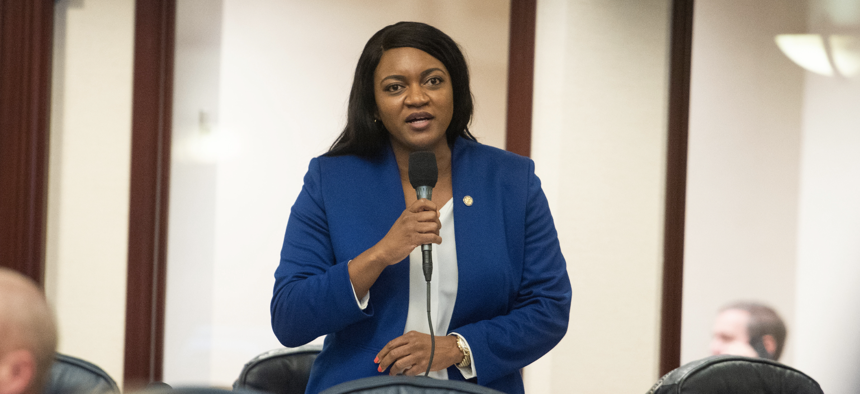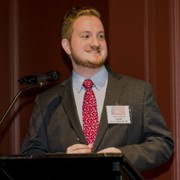A 'rare opportunity': Fentrice Driskell looks at the challenges ahead for Florida House Democrats
In an interview with City & State, the incoming House Democratic Leader says she hopes to build a 'caucus that will be better able to weather political changes.'

State Rep. Fentrice Driskell, D-Tampa, offers debate on the House floor, April 3, 2019. Florida House of Representatives
It’s been a rough year for the Democrats of the Florida House of Representatives.
They were rocked by sudden scandal that fueled a leadership change and affected preparations for a midterm election that could turn the House even more red.
State Rep. Fentrice Driskell, the incoming House Democratic leader and former Democratic Policy chair, is tasked with righting the ship and weathering the expected stream of bills from the GOP majority they’ll oppose in 2023. The Harvard undergraduate and Georgetown law grad, who represents north Hillsborough County, first took office in 2018.
Her ascension, however, is marking several historic firsts for the caucus. She is the first Black woman to become its chair, as well as the first person set to hold the position for four years since term limits were implemented. She’s used to breaking barriers, though: Driskell was Harvard’s first Black woman student body president.
Tallahassee’s Ramon Alexander had been set to be House Democratic Leader. He was accused, however, of sexually harassing a former employee of Florida A&M University, Alexander’s alma mater. He has denied the allegations but also decided not to seek reelection. Driskell had been chosen by her peers to lead after Alexander but now she will serve as leader two terms in a row.
City & State recently spoke with Driskell about her past, present and future, including her goals for her record-setting tenure. (Questions and answers have been edited for clarity and brevity.)
Q: When did you first decide you wanted to become involved in politics?
Driskell: I thought I wanted to be an engineer. I love the sciences. And it wasn't until I took (advanced placement) government and economics that I really felt like I found my home academically. My teacher saw that I had a particular interest in it. And he encouraged me to get involved in youth government programs. One of them, the Florida Girls State program run by the American Legion, takes high school girls between their junior and senior year to Tallahassee for a week to learn about government at every level.
That really was a flashpoint in my life. I decided that summer that someday I would run for office. I decided I would go to college and study government, and become a lawyer because it became very clear to me that law really is the language of government and politics.
Q: Your first race was in 2018 against Republican incumbent Shawn Harrison. (She beat Harrison by seven percentage points.) What was the political climate like at the time?
Driskell: The 2016 election happened, and I felt there were ways in which I didn't recognize my own country in the sense that political conversations had taken on such rancor. It seemed that people on opposite sides of the aisle could no longer even talk to one another in a respectful manner. I'm someone who has developed a skill set as a consensus builder, and thought that I would have something to offer to my community and to the process, and wanted to do my part in trying to make the process a little better and more civil.
Q: How did that race give you insight on how to be successful challenging GOP incumbents?
Driskell: You have to be willing to listen to the community and try to understand what the community wants. People in my district wanted representation that was more accessible. They wanted to have a representative who was visible in the community and who listened. They wanted someone who was not extreme or polarizing on one end of the political spectrum or the other. They wanted someone who cared about the issues that they cared about and who could think through balanced and sensible solutions.
Q: House Democrats fought against what’s been called the “culture war” agenda this year. What was that like?
Driskell: It was very difficult for our caucus because so many of the issues just felt like attacks on marginalized communities. We watched as the leadership of Governor DeSantis and the Florida House majority just completely suppressed the stories of so many people, whether it was pregnant women with the 15 week abortion ban or the ‘Don't Say Gay’ bill, which is suppressing our LGBTQ+ students and their families. I mean, it was just an awful session.
What we have to do and what we tried to do is push for accountability, push for transparency, try to make the bad bills better through amendments. And even though those amendments may not be accepted, it gives us an opportunity to communicate to the public in an additional way, and say to them that in Tallahassee, they won't even allow us to try and moderate some of their more extreme policies.
This next session, it's come to light that majority leadership intends to pass legislation on permitless carry. We know that to everyday Floridians such legislation is tone deaf, especially given that we've had two mass shootings in the state of Florida, with the Pulse shooting and then Parkland. It's going to be my caucus’ job, for that legislation and other bad legislation that's likely to come down the pipe, to make sure that we are doing everything we can to stop it, but also to activate the public to apply pressure so that these bad bills don't pass.
Q: How is the caucus dealing with the Alexander controversy?
Driskell: Three years ago or so, we moved towards a system where we started electing our leader-designates much earlier. It's allowed us to have leaders in waiting, who were ready on day one, anytime there's a change in leadership. I'd say that, yes, it has been a challenging time for the caucus with so much change. They've placed a lot of faith in my ability to lead us through this challenging time. But we have done the best to our ability to account for that change by having leaders elected much sooner.
Q: What do you want your legacy to be?
Driskell: The impact that I want to have on this caucus with having the ability to have four years and leadership is to build out some infrastructure that will last beyond me, build infrastructure that's not so dependent on who the leader is. I think that will benefit the caucus, the party, the process, and ultimately, the public, to the greatest extent possible, because what happens right now is you have a leader for two years who comes in and builds this infrastructure and then when they leave, it gets washed away, just like a sandcastle.
So by having this rare opportunity to have four years, I have the time and the runway to more fully engage the caucus, and really get their buy-in on what is the structure they want. I think you'll see a stronger, tighter Democratic caucus, that will be better able to weather political changes.
NEXT STORY: This week’s biggest Winners & Losers
